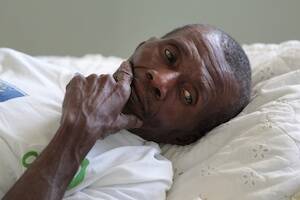A cholera epidemic that erupted in earthquake-shattered Haiti entered its second year on Oct. 19 as aid agencies promoted a new weapon to battle the deadly water-borne disease. Through Oct. 9 of this year, 469,967 cases of the disease have been reported, leading to 6,595 deaths, now the world’s largest cholera outbreak. Led by the Boston-based Partners in Health, aid agencies plan a vaccination program that could reduce the incidence of cholera and prevent the rapidly transmitted illness from overrunning vulnerable communities. Partners in Health is targeting Haitians in isolated rural villages and those still living in tent camps without access to clean water in quake-devastated Port-au-Prince. It estimates that only about 54 percent of all Haitians have access to clean water. The agency hopes to inoculate more than 100,000 people beginning in January. “What we’re proposing is not a trial,” said Paul Farmer, who co-founded Partners in Health. “The vaccine has been proven safe. It’s yet another effective measure against this epidemic.” The problem, he said, is raising $300,000 to fund the campaign, because the world has moved on to other concerns.
Cholera Persists in Haiti
Show Comments (
)
Comments are automatically closed two weeks after an article's initial publication. See our comments policy for more.
The latest from america
In these dark times, surrounded by death and destruction in Gaza, we hear the command in the first reading, “Choose life.” What are the ways we can do this in a world that seems to have gone mad?
On July 31, Pope Leo XIV announced that St. John Henry Newman, English theologian, educator, and writer who converted to Catholicism after being an Anglican priest, will be named a Doctor of the Church.
The chair of the USCCB Committee on International Justice and Peace put out a statement on July 31 demanding more humanitarian action for those in Gaza.
Latin Mass, Eucharistic Revival, real presence: In every age—including our own—the church has seen a complex Eucharistic landscape.








